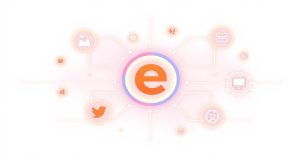In today’s dynamic e-commerce landscape, Etsy sellers often seek efficient methods to manage their growing businesses. Etsy integrations offer a powerful solution, connecting your shop with a myriad of external tools designed to automate tasks, enhance operational efficiency, and expand your market reach. Understanding these powerful connections is crucial for any seller aiming to scale their brand, reduce manual effort, and focus more on creativity. This guide explores the essential types of Etsy integrations and how they can transform your selling journey, ensuring a smoother, more profitable operation.
Understanding Etsy Integrations for Enhanced Selling
Etsy integrations involve linking your Etsy shop with third-party software applications that provide specialized functionalities beyond the platform’s native offerings. These connections enable seamless data flow, automating processes like order fulfillment, inventory tracking, and financial reporting. By leveraging effective Etsy integrations, sellers can significantly reduce the time spent on administrative tasks, minimize errors, and gain valuable insights into their business performance. The ultimate goal is to create a more cohesive and efficient workflow that supports sustainable growth for your unique handmade or vintage offerings.
Key Integration Types to Optimize Your Etsy Shop
Optimizing an Etsy shop requires more than just listing appealing products; it demands smart management across various business facets. Etsy integrations address this need by providing specialized tools for different operational areas. From managing incoming orders to tracking finances, these integrations are designed to simplify complex processes. Exploring the diverse range of available integration types allows sellers to identify specific solutions that align with their business model, helping them to streamline tasks and enhance overall productivity effectively. Each integration type serves a distinct purpose in the seller’s ecosystem.
1. Shipping and Fulfillment Solutions
Efficient shipping is paramount for customer satisfaction, and specialized Etsy integrations can revolutionize this process. These tools automate label creation, compare carrier rates, and provide real-time tracking updates to both sellers and buyers. By connecting your Etsy store with a shipping integration, you can batch process orders, print labels quickly, and even manage returns more effectively. This not only saves considerable time but also often results in reduced shipping costs due to negotiated rates, directly contributing to higher profitability. Streamlining your shipping ensures timely deliveries and happier customers.
2. Inventory and Order Management Systems
For sellers with a diverse product range or those operating across multiple sales channels, robust inventory and order management are vital. Etsy integrations in this category provide centralized dashboards to track stock levels, sync inventory across various platforms, and manage incoming orders efficiently. These systems prevent overselling, update stock automatically, and offer insights into product performance. Implementing such an integration helps maintain accurate records, reduces manual data entry errors, and ensures that you always have a clear picture of your product availability, simplifying your Etsy business operations.
3. Accounting and Financial Tracking Tools
Accurate financial management is the backbone of any successful business. Etsy integrations for accounting automate the process of recording sales, expenses, and taxes. They connect directly with your Etsy transaction data, categorizing income and outgoings, making bookkeeping significantly easier. Sellers can generate detailed reports, track profitability, and simplify tax preparation throughout the year. These tools are indispensable for understanding the financial health of your Etsy shop, providing clear visibility into your earnings and expenditures without the need for complex manual spreadsheets.
4. Print-on-Demand and Production Partners
Many Etsy sellers utilize print-on-demand (POD) services to offer custom products without holding physical inventory. Integrating your Etsy shop with a POD partner automates the entire fulfillment process: when a customer places an order, it’s automatically sent to the production partner for printing and shipping. This type of Etsy integration is ideal for expanding product lines, testing new designs, and reducing upfront investment risks. It allows creators to focus on design and marketing, while the logistics of production and shipping are handled seamlessly by the integrated service, making scaling easier.
5. Marketing and Customer Relationship Management
Effective marketing and strong customer relationships are key drivers of long-term success for an Etsy business. Integrations in this area connect your Etsy shop with email marketing platforms, social media schedulers, or customer relationship management (CRM) systems. These tools help segment your audience, send targeted promotions, manage customer inquiries, and track engagement. By centralizing customer data and automating communication flows, sellers can build loyalty, drive repeat purchases, and enhance their brand presence across various digital channels, fostering a more connected customer base.
Choosing the Right Integration Strategy for Your Business
Selecting the most suitable Etsy integrations requires careful consideration of your specific business needs, budget, and growth aspirations. Begin by identifying your biggest pain points and areas where automation could yield the most significant benefits. Evaluate the features offered by different integration solutions, paying attention to their compatibility with Etsy, ease of use, and scalability. Many tools offer free trials, allowing you to test their functionality before committing. A well-thought-out integration strategy ensures that you invest in tools that genuinely enhance your operational efficiency and contribute to your overall success.
Integration Costs and Value for Etsy Sellers
The cost of Etsy integrations can vary widely, from free basic plans to premium subscriptions offering advanced features. When evaluating pricing, consider the long-term value and return on investment (ROI) that an integration provides. Free options may suffice for new or smaller shops, while growing businesses might find the efficiency gains and time savings from paid tools far outweigh the monthly fees. Compare features like transaction limits, multi-channel support, and customer service. Strategic investment in the right Etsy integrations can significantly reduce operational costs and boost profitability over time, proving their worth.
Navigating Common Integration Challenges
While Etsy integrations offer numerous benefits, sellers may encounter challenges during setup or ongoing use. Common issues include data synchronization errors, compatibility problems between different platforms, or a steep learning curve for new software. It is important to research customer support options and user reviews before committing to an integration. Regularly monitoring your integrated systems for anomalies and understanding how to troubleshoot basic issues can prevent larger disruptions. Proactive problem-solving ensures that your Etsy integrations continue to run smoothly, maintaining seamless business operations.
Maximizing Profitability Through Strategic Integrations
Ultimately, the strategic implementation of Etsy integrations aims to maximize profitability and foster sustainable growth. By automating mundane tasks, reducing human error, and providing actionable insights, these tools free up valuable time for sellers to focus on product development, marketing, and customer engagement. The increased efficiency leads to reduced operational costs, while improved customer experiences can drive higher sales and repeat business. Embracing a smart integration strategy allows Etsy sellers to scale their operations effectively, turning their passion into a thriving and profitable enterprise.
Empowering Your Etsy Journey with Smart Connections
Etsy integrations are more than just supplementary tools; they are essential components for any seller striving for efficiency, growth, and a professional online presence. From streamlining shipping to automating accounting, these connections empower entrepreneurs to manage their shops with greater ease and precision. By thoughtfully selecting and implementing the right integrations, sellers can transform their Etsy business into a well-oiled machine, capable of handling increased demand and complex operations. Embrace the power of smart connections to elevate your Etsy journey and achieve lasting success in the competitive e-commerce world.




